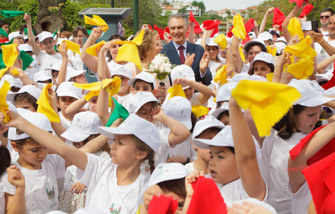
First of all I want to congratulate author Claudio Magris, a major figure in contemporary European culture, to whom the first edition of the Helena Vaz da Silva Prize has been awarded.
This prize is intended to annually distinguish a citizen who, throughout his career, has stood out in the dissemination, defence and promotion of the European Cultural Heritage.
This European label is firmly attached to the name it has been given and in which tribute is paid to a Portuguese individuality, whose intellectual and civic profile is deeply involved both with Europe and with culture itself.
Helena Vaz da Silva passed away a little over ten years ago, when there was still much to be expected from both her mind and dynamism.
Other indelible markers, however, were left with the institutions in which she served the Country and the European Union.
As a journalist and, above all, as member of the European Parliament, Helena Vaz da Silva was untiring in the promotion of the values of a Europe whose identity lies, before all else, in the sharing of the cultural roots that, throughout centuries, in peace and in war, bonded between them the various peoples that settled in the continent.
As officer responsible for UNESCO’s National Committee, she fought boldly and very successfully for the recognition and promotion of Portuguese temporalities as World Heritage.
As President of the National Centre for Culture, for more than 20 years, her actions were notable in the defence and dissemination of our language and our heritage.
To attribute the name of Helena Vaz da Silva to a Prize with these features is not just a gesture of gratefulness and nostalgia, which was anyway fully due. It is equally the proof that her drive for the preservation of the Portuguese and European cultural heritage was not in vain.
I thus want to believe, having known Helena Vaz da Silva, in which some of us, including myself, were so privileged, that the award of a prize with her name to someone such as Claudio Magris would be a source of great pleasure for her.
There surely will not be, in our days, another author in whose work the European idea is moulded with such rigour and sensitivity, with such wisdom and profoundness.
Not so very long ago, a renowned international magazine termed Claudio Magris as «the most European of living authors».
Europe is in fact a theme and a concern that is repeated in his essays and articles, a buttress that underlies all his novels.
This is not an abstract idea, or that of a Europe closed down like a fortress, supposedly unchangeable since its origin.
The Europe of Claudio Magris is a Europe that shows in its genetic code a diversity of peoples and languages, a Europe that throughout the centuries composed and condensed itself, in confrontation and in dialogue between different civilizations and cultures.
The most famous of his novels, which was named after the River Danube, may even be considered as a hymn to peaceful conviviality and to tolerance amongst peoples.
More than a travel book, Danube is a true symbol of that «spiritual continent» which is European culture.
Travelling both of the river’s margins, from its sources, in Germany, to the Black Sea, the author recovers all those mosaics of different peoples, which either fought or negotiated amongst themselves; knew empires and revolutions; lived, after all, history’s contingencies, but always found the means to resume dialogue, although each of them preserving their own identity.
At a time such as this, in which so many query themselves as to the fairness and the viability of the European Union project, the works of Claudio Magris have the virtue of recovering the foundations of that project, allowing us to face it, not just as a solution for the immediate issues, but also as an irrefutable destiny to which the past has led us.
I thus renew my congratulations to the author of such an original work so infused with sensitivity. My wishes are that the values that influenced this work recur in the construction of the Europe we all want, a Europe where peace, tolerance and prosperity are preserved.
I would equally like to congratulate those Portuguese responsible for the projects which were rewarded, this year, with the Europa Nostra Prize.
I am very pleased with the distinction attributed to them and for the much it represents, by recognizing the interest and care we must reserve for the extraordinary heritage that our ancestors bequeathed us.
I congratulate, finally, all the organizations associated to the award of these Prizes, particularly the National Centre for Culture, which has been, amongst us, throughout the last decades, an example of the much that can be achieved in the public interest by citizens’ initiative.
To you all, our best thanks.
© 2006-2016 Presidency of the Portuguese Republic
You have gained access to the records of the Official Site of the Presidency of the Republic from 9 March 2006 to 9 March 2016.
The contents available here were entered in the site during the 10 year period covering the two mandates of President of the Republic Aníbal Cavaco Silva.